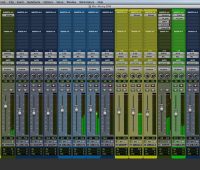Entertainment of the Revolutionary Artists
Entertainment of the Revolutionary Artists
Elevating your brand with quality entertainment, production, and media
Our Services

Entertainment
Do you need entertainment for your event? We have vocalists, musicians, dancers, visual, and culinary artists that will fulfill your needs.

Music Production
Are you looking for music for your song, movie, or podcast? We have experienced producers that can create a song you'll love!

Video Production
Your brand needs stunning visuals, and we can help! With a multipurpose facility, we can help create the visuals you need!

Post Production
From mixing and mastering to video editing, our experienced staff can bring your vision to life!
Why Choose Us
Benefit 1
Access to the Philadelphia Music and arts Community
Benefit 2
Over 30 years of combined experience in the field
Benefit 3
Global impact through strategic partnerships
Benefit 4
Dedicated to the success of your vision and brand
About Us
For the creative change-maker who utilizes their art for good, for the impactful innovator who does not want to conform to the mainstream, for the content creator that strives to develop great media, we’ve got you covered!
With ERA, you get a team of dedicated professionals with over 30 years of combined experience in entertainment, production, and media. Whether you need musicians for your or record, mixing, mastering, and editing services for your media, or production services for your event, our deep roots in the entertainment industry can provide you with the resources you need without breaking the bank!
As a community focused organization, we develop experiences for the community that will help guide individuals to the resources that they need. From community festivals, to educational programming, our goal is to inspire, educate, and empower individual globally, while bridging generational and cultural gaps.
Client Testimonials



Entertainment of the Revolutionary Artists is proudly powered by WordPress